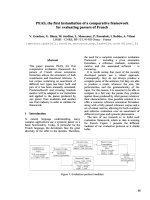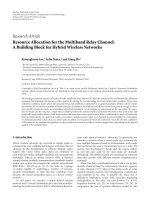The executive job search a comprehensive handbook for seasoned professionals
Bạn đang xem bản rút gọn của tài liệu. Xem và tải ngay bản đầy đủ của tài liệu tại đây (7.08 MB, 268 trang )
THE
EXECUTIVE
JOB SEARCH
This page intentionally left blank.
THE
EXECUTIVE
JOB SEARCH
A Comprehensive Handbook
for Seasoned Professionals
ORRIN WOOD
M C G R AW- H I L L
N E W YO R K
MADRID
C H I C AG O
SAN FRANCISCO
MEXICO CITY
SEOUL
MILAN
SINGAPORE
LISBON
NEW DELHI
SYDNEY
LONDON
S A N J UA N
TO RO N TO
Copyright © 2003 by Orrin Wood. All rights reserved. Manufactured in the United States of America. Except as permitted under
the United States Copyright Act of 1976, no part of this publication may be reproduced or distributed in any form or by any
means, or stored in a database or retrieval system, without the prior written permission of the publisher.
0-07-142302-7
The material in this eBook also appears in the print version of this title: 0-07-140942-4
All trademarks are trademarks of their respective owners. Rather than put a trademark symbol after every occurrence of a
trademarked name, we use names in an editorial fashion only, and to the benefit of the trademark owner, with no intention
of infringement of the trademark. Where such designations appear in this book, they have been printed with initial caps.
McGraw-Hill eBooks are available at special quantity discounts to use as premiums and sales promotions, or for use in corporate training programs. For more information, please contact George Hoare, Special Sales, at or (212) 904-4069.
TERMS OF USE
This is a copyrighted work and The McGraw-Hill Companies, Inc. (“McGraw-Hill”) and its licensors reserve all rights in
and to the work. Use of this work is subject to these terms. Except as permitted under the Copyright Act of 1976 and the
right to store and retrieve one copy of the work, you may not decompile, disassemble, reverse engineer, reproduce, modify,
create derivative works based upon, transmit, distribute, disseminate, sell, publish or sublicense the work or any part of it
without McGraw-Hill’s prior consent. You may use the work for your own noncommercial and personal use; any other use
of the work is strictly prohibited. Your right to use the work may be terminated if you fail to comply with these terms.
THE WORK IS PROVIDED “AS IS”. McGRAW-HILL AND ITS LICENSORS MAKE NO GUARANTEES OR WARRANTIES AS TO THE ACCURACY, ADEQUACY OR COMPLETENESS OF OR RESULTS TO BE OBTAINED FROM
USING THE WORK, INCLUDING ANY INFORMATION THAT CAN BE ACCESSED THROUGH THE WORK VIA
HYPERLINK OR OTHERWISE, AND EXPRESSLY DISCLAIM ANY WARRANTY, EXPRESS OR IMPLIED,
INCLUDING BUT NOT LIMITED TO IMPLIED WARRANTIES OF MERCHANTABILITY OR FITNESS FOR A PARTICULAR PURPOSE. McGraw-Hill and its licensors do not warrant or guarantee that the functions contained in the work
will meet your requirements or that its operation will be uninterrupted or error free. Neither McGraw-Hill nor its licensors
shall be liable to you or anyone else for any inaccuracy, error or omission, regardless of cause, in the work or for any damages resulting therefrom. McGraw-Hill has no responsibility for the content of any information accessed through the work.
Under no circumstances shall McGraw-Hill and/or its licensors be liable for any indirect, incidental, special, punitive, consequential or similar damages that result from the use of or inability to use the work, even if any of them has been advised
of the possibility of such damages. This limitation of liability shall apply to any claim or cause whatsoever whether such
claim or cause arises in contract, tort or otherwise.
DOI: 10.1036/0071426027
To my wife, Joan, and my children,
Patsy, Susie, Ned, and Tim, and their families,
who have enriched my life in so many ways
This page intentionally left blank.
For more information about this title, click here.
CONTENTS
Preface • xi
How to Find What You’re Looking For
xii
Acknowledgments • xiii
1. GETTING PERSPECTIVE • 1
You’ve Got a Wonderful Opportunity
Coping with Losing Your Job
You’ve Got a Lot Going for You
Getting Things in Focus
How Much of a Factor Is Your Age?
Dealing with a Rapidly Changing World
Getting What’s Yours
1
2
4
5
8
10
11
2. GETING OFF TO A GOOD START • 13
Why a Good Start Is Important
Improving Your Mental Outlook
Avoiding Pitfalls
Dealing with Your Family
Good Counseling Can Be a Great Help
Organize to Work Efficiently
Record Keeping
13
14
14
17
18
19
20
3. DETERMINING YOUR JOB GOALS • 21
Career Phases
The Search Process
Job Goals
Job Priorities
Alternative Career Analysis
Alternative Job Analysis
21
23
24
25
35
41
4. THE JOB SEARCH FROM THE EMPLOYER’S SIDE OF THE DESK • 45
Acknowledging the Employers’ Problems
45
Understanding the Difficulties in Recruiting
47
vii
Copyright 2003 by Orrin Wood. Click Here for Terms of Use.
THE EXECUTIVE JOB SEARCH
5. IMPROVING YOUR ATTRACTIVENESS TO EMPLOYERS • 55
Presenting Yourself Favorably
Remembering All Your Accomplishments
Recognizing Your Major Accomplishments
Presenting Your Accomplishments
55
56
57
60
6. MAKING YOUR RESUME AN EFFECTIVE TOOL • 67
Perspective
Types of Resumes
Features of Resumes
Tips on Writing Resumes
Preparing Your Resume
Getting Your Resume Effectively Criticized
Some Additional Thoughts on Resume Tips
Major Resume Problems
67
68
69
80
80
81
82
84
7. NETWORKING • 87
How Are You Likely to Get Your Job?
Enlarging Your List of Contacts
Getting Interviews with Contacts
Preparing for Networking Interviews
Building Rapport in Networking Interviews
Being Alert to Hidden Job Possibilities
Getting Good Referrals
Getting Good Information on Referrals
Getting Personally Introduced to Referrals
Giving Something Back in Return
Getting More Candid Criticism
Developing a Continuing Relationship
Analyzing Interview Results and Follow-up
Conducting Telephone Interviews When Referrals
Won’t See You
8. BLIND PROSPECTING • 111
Overview
Target Letter Mailings
Telephone Prospecting
Broadcast Letter
Preparation for Blind Prospecting
Record Keeping
viii
87
90
95
99
100
101
102
103
103
104
105
106
108
108
111
113
113
116
118
119
CONTENTS
9. THE VISIBLE MARKET • 121
Executive Recruiters
The Internet
Answering Ads
Job Fairs
College Placement Offices
Secondary Recruiters
When You’re Contacted for an Interview
122
123
124
127
128
129
129
10. “JOB HUNTING IS SELLING YOURSELF” • 131
Selling Yourself Is a Key
Focus on Improving Your Selling Skills
Some Selling Techniques
Dealing with Rejection
131
131
135
139
11. PREPARING FOR INTERVIEWS • 141
Researching the Company
Research on the Interviewer
Your References
Being Ready for Tough Questions
Practicing Listening and Interviewing
Learning from Interviews
142
143
144
145
148
148
12. IMPROVING YOUR INTERVIEW EFFECTIVENESS • 149
Perspective
The Interview
Postinterview Activities
Interview Tips
149
150
157
160
13. CONDUCTING AN EFFECTIVE SEARCH • 163
Getting Started
Personal Habits
Improving Your Productivity
Getting Help
Checklist for a Dragging Campaign
163
168
169
174
175
14. EVALUATING OFFERS AND MAKING THE FINAL DECISION • 183
The Process
183
Stalling Offers
184
Getting More Information on the Job and Company
185
Using an Offer to Get Others
186
Negotiating Compensation
187
ix
THE EXECUTIVE JOB SEARCH
Evaluating Offers
After the Final Decision
190
191
15. SHOULD YOU MAKE A JOB CHANGE?
(IF YOU HAVE A CHOICE) • 195
Myths About Changing Jobs
Why Are You Frustrated?
Your Improvement Program
Get Another Job in the Company
How to Leave Your Company
When an Executive Recruiter Knocks on the Door
196
197
198
206
207
209
16. ALTERNATIVE CAREERS • 211
Motivation
Realities
Research
Resources and Services
Consulting
Temping
Buying a Business
Starting a Business
Making a Transfer to Another Function in Your Company
Working for a Nonprofit or Trade Association
212
212
213
214
215
218
219
224
225
226
17. MAKING THE NEW JOB AND YOUR FUTURE A SUCCESS • 229
Transition
229
Getting Started
234
Plan for the Future
238
Conclusion
240
Send in for Additional Tips • 241
Index • 243
x
PREFACE
Most job hunters are carrying out the right activities, but those who
aren’t making reasonable progress are not doing these activities effectively. In doing this they’re underselling themselves. Someone
who shoots 100 in golf is trying to hit the same types of shots as
someone who shoots par; he or she just isn’t hitting them as well.
This book shows you how to improve your job hunting score from,
say, 100 to about 80.
This improvement occurs in two steps. In the first step, you will
become better prepared for your job search by becoming more effective in determining your goals, writing a top-flight resume, gaining access to key people, succeeding in interviews, and dealing with
frequent rejections. In the second step, you will apply the newly
learned techniques in every step of your job search, while learning
from rejections and mistakes.
This book explains in depth many of the techniques top-flight outplacement firms use with their clients. The best firms have developed the most practical and successful techniques for their job
hunters to follow. Many of the techniques explained in this book
aren’t included in other books, or they are not described in enough
detail to be really useful. This book describes each step clearly and
provides good examples so that you can apply them as you need to.
Among the things you’ll learn are how to improve your networking, blind prospecting, approaching recruiters, using the Internet, and
answering ads. You’ll learn how to be a better salesman of yourself
and how to be a better negotiator. You’ll also be shown techniques to
use your time better, improve your decisions, and become a better selfcritic. You’ll learn how to gain the most from using the many resources
xi
Copyright 2003 by Orrin Wood. Click Here for Terms of Use.
THE EXECUTIVE JOB SEARCH
available to job hunters such as job-help workshops, former and current job hunters, executive recruiters, the Internet, key executives, and
other sources for their knowledge, moral support, and advice. In Chapter 13, “Conducting an Effective Search,” you’ll find a checklist to help
you evaluate the status of your job search and identify the source of any
problems you may be having and some ways to correct these problems.
This book places particular emphasis on networking, and it provides a 12-step program for networking productivity. In DBM’s recent survey of over 28,000 job hunters who secured jobs in 2001, 60
percent of the respondents said that networking was the source of
their new job. This figure is 74 percent of those whose new job
source is identified. Yet most job hunting books don’t give instructions on how to improve networking.
HOW TO FIND WHAT YOU’RE LOOKING FOR
There are two ways to use this book. One way is to look over the contents and focus on your specific current interests. Skimming the surface this way may work out. If that’s your choice, I hope it does.
However, a cursory reading may not help you avoid taking a job that
is really not right for you for one reason or another. In my experience,
one quarter of the new jobs people take don’t work out—in fact,
many don’t last a year. Are you willing to run this high a risk?
The second approach—the one I highly recommend—is to start by
carefully reading the contents, then skimming the whole book to get
an understanding of its complete program. Then you should carry out
the book’s exercises and instructions to prepare a well-organized
search, sticking with it until you get an offer that’s in line with your
job interests and needs at this stage of your career. In time you’ll find
which of the techniques are most useful for you. The prospect may
appear to be a longer search—and it could be, but not necessarily. It
does, however, increase the chances considerably of your getting a
better fit—and it could even take less time.
xii
ACKNOWLEDGMENTS
I’m grateful to these Outplacement and Human Resources professionals for their wise counsel on the book:
• Robert H. Ellis, Ph.D., Principal, Ellis Management
• James R. Jandl, Vice President Human Resources, Oxford
Global Resources, Inc.
• Cynthia A. Sullivan, Principal, Career Strategies, Inc.
• E. Brian Veasy, Senior Marketing Consultant, R. L. Stevens &
Associates, Inc.
Others over many years have been a great source of advice and
support: Dr. Lee Wotherspoon, Robert M. Armstrong, F. Gordon
Brigham, Jr., Neil S. MacKenna, Gail Morrissey, and Ephriam Radner.
I’m grateful to Grace Freedson, who as my agent has been a
frequent source of wise advice and strong encouragement. I also
appreciate the efforts that Barry Neville, my editor, has made on my
behalf. Elizabeth Case, my assistant, has provided help over and
above the call of duty.
xiii
Copyright 2003 by Orrin Wood. Click Here for Terms of Use.
This page intentionally left blank.
THE
EXECUTIVE
JOB SEARCH
This page intentionally left blank.
CHAPTER 1
GETTING PERSPECTIVE
YOU’VE GOT A WONDERFUL OPPORTUNITY
Perhaps you’re out of work. Perhaps you’re still on a job but you’re
not happy and about to quit. Perhaps you were in the wrong place at
the wrong time, or you missed some of the warning lights on your
last job choice.
Whatever. Now you have a crucial choice: Are you looking for just
another job, which, if you’re lucky, will turn out to be what you really
want for the long run, or are you determined to get the job you’ve
dreamed about for a long time, a job that you really like to do, that
emphasizes your strengths, that connects you with stimulating people, and that has strong, long-term prospects?
The choice is yours. You can do anything you want.
Does this kind of dream job sound too good to be true? It can be
a reality, but you have to work smartly to get this dream job. It may
take more work to get a dream job than an ordinary job, and the
process may be riskier. But the rewards are far greater.
There are five essentials for success:
Have a positive attitude. People respond more positively to winners than they do to losers.
Don’t reinvent the wheel. Millions have carried out job searches
before you have, and virtually all have done so successfully. You
1
Copyright 2003 by Orrin Wood. Click Here for Terms of Use.
THE EXECUTIVE JOB SEARCH
know quite a few of them. Many can give you good advice and
useful resources and techniques. They can also put you in touch
with other helpful and supportive people.
Be thorough in preparing for your job search. The preparations
described for your search are more comprehensive than in most
books. Too many job hunters shortchange themselves on these
steps, only to regret it later. Overlap steps to speed things up.
For example, while waiting for resume critique feedback, prepare
your contact list with addresses and phone numbers.
Keep working on improving your job hunting skills in every
aspect of your search.
Conduct an active search once you’ve completed your preparation.
Set a goal of 7 to 10 networking or job interviews a week.
If you haven’t read the preface, you’ll find that reading it is helpful
by describing what the book covers and how to use it most effectively.
COPING WITH LOSING YOUR JOB
The Career Initiatives Center (CIC) is a “career transition services”
organization for displaced midcareer job hunters in Cleveland. The
first thing they give new candidates is the pamphlet Coping with
Loss by Robert B. Garber. The pamphlet enumerates the “stages of
job-loss crisis” most job hunters go through to varying degrees:
Shock
Denial and/or disbelief
Self-isolation
Anger
Bargaining
Guilt and remorse
Panic
2
GETTING PERSPECTIVE
Depression
Understanding of and resignation to the situation
Acceptance of reality
Building a positive outlook
Opportunity, growth, and new direction
While the list looks formidable, remember that these feelings are
normal and millions have gone through them before you and have
survived. You’ll find you’ll go through most of these stages, a few not
even recognizing it, and not always in this exact order. This book will
show you how to deal with them by focusing on your future and conducting a very active job search. If you do these two things well, then
the stages become manageable.
Whether you were laid off or fired, having negative feelings is normal, but be sure to control them. Work on developing a positive attitude. Don’t criticize your ex-employer to others because people who
might help will fear your criticism as well.
Develop a positive explanation of why you are “looking.” It may
be something like “Things were OK, then there were changes [a new
boss, your project was a disappointment, or the company slipped
overall]. I was just one of the people laid off. Several senior people at
XYZ know my work and will give me strong recommendations. With
my experience and my capabilities, in time I’m sure I’ll find another
good job.”
There’s still some stigma to being out of work, but not as much
as there was 20 or 25 years ago. It happens too frequently now and to
too many competent and hard-working people. In the old days executive recruiters rarely risked recommending people who had lost
their jobs. Today they’re considerably more likely to recommend them.
Wanting to vent your anger, fear, and frustration is quite normal. If
you have to let it all out, be careful whom you do it with. Approach at
most one or two people you trust, people who’ll give you permis3
THE EXECUTIVE JOB SEARCH
sion to do it. Often the best people are those who have been through
a difficult midcareer job search themselves.
Feeling uncomfortable in revealing your salary (which you’ve
always kept private) or having to describe some distasteful aspects
of your prior jobs is common. Unfortunately providing such personal information is part of the process, but you’ll soon get used to
doing so.
You’ll probably feel awkward socializing at parties, community
meetings, or church. You can manage such circumstances by identifying people that you feel comfortable with and socializing with
them. Such casual acquaintances can often provide networking interviews. Inevitably you’ll run into a few people who want to pry.
Decline to answer their questions. Change the subject or walk away.
Their prying tells more about them than it does about you.
YOU’VE GOT A LOT GOING FOR YOU
You took certain things for granted when you were employed. Now
that you’re “in between,” those things may not seem so positive. The
things themselves haven’t changed; recognize that it’s your perspective that has. Let’s look at a few of these things and think about how
important they are in your whole scheme of things:
Your family or partner strengthens the central core of your being
and is greatly satisfying.
You have had many years of experience in various roles and have
produced a credible record, which, if properly marketed, will be
attractive to several good employers.
You’ve developed many skills that earned you your recent,
important position. These skills will be useful in your job search
and in your future.
You have a circle of friends who are important to you. Some of
them will help you at this time.
4
GETTING PERSPECTIVE
The organizations that you belong to, such as church and
community groups, have satisfied you and have broadened your
horizons, and they may also help you during this search.
Your hobbies and outside interests have always given you pleasure
and have broadened your experiences.
Your material possessions fulfill you.
Even though you’re uncertain at this time, look around you and remember all the people you’ve seen leave one job and find a new job similar to or better than the old one. You’ll get a good job too, although it
will take some hard work and will undoubtedly cause much frustration.
Losing a job is a major loss—of income, of opportunity to get experience, and of time. On the other hand, it isn’t a complete loss.
Rather, it’s an opportunity to assess your values and goals and to become more realistic about them. It’s an opportunity to get your life
back on track, to make conscious choices that will move you closer
to your goals. It’s an opportunity to improve your skills of selling
yourself, of making decisions, and of managing your job search —all
of which will be useful in your new job and in your personal life in
the future. You have a chance to be more creative and more assertive,
to ask for support, to expand your horizons, and finally, when it’s all
over, to have made new friends and broadened your network.
GETTING THINGS IN FOCUS
Some people describe job hunting as “selling yourself.” There’s no
question this is a key aspect of the process. In selling yourself, you
inevitably get rejected a lot. Even those who are highly sought after get
rejected. Adding this rejection to your negative feelings about leaving your last job can discourage you. Think of rejection as a bump
in the road, and remember that you’re moving in the right direction.
When facing a job search, which is difficult under the best of circumstances, many job hunters undersell themselves. A key feature of
5
THE EXECUTIVE JOB SEARCH
this book is that it can help you develop skills to overcome this tendency and help you become a more effective job hunter.
When you first tried to ride a bike, you probably fell off many
times. Through trial and error, eventually you learned how to stay
on it. A month or two later you were probably racing your buddies.
Similarly, when you made your first presentation to a boss, you probably made mistakes, but, over time, as you made more presentations,
you got more convincing. Now you’re job hunting—which is something you’ve probably done several times before. But this time, because you’re now midcareer, it’s tougher. Many of the jobs you seek
have been eliminated, so there’s more competition for the few remaining jobs. The following strategies can help you:
Are you willing to settle for “just another job,” or are you determined to find the job you deserve, one that really turns you on?
In commenting about Americans, Winston Churchill once said,
“You can always get them [Americans] to do the right thing after
they have exhausted all the other possibilities,” (Finding Work
Without Losing Heart—Bouncing Back from Mid-career Job
Loss, William J. Bryan, SJ, Adams Publishing, 1995). Make it
easy on yourself. Do the right thing the first time around. Start
your search with a careful self-assessment, as described in
Chapter 3, “Determining Your Job Goals.”
Select two or three trusted friends to act as advisors on your job
search. Find people you’re confident in, and you can talk to
every few weeks about your progress, and who will be accessible
on short notice for advice on major decisions.
Join a job search workshop. You can learn a lot participating in a
good one. It’s a comfort seeing other capable people “in the same
boat” with whom you can develop mutual support. Just disregard
the naysayers.
6
GETTING PERSPECTIVE
Seek out successful job hunters who may have useful ideas from
their own experience and know of good resources and helpful
people. Ask them what they have found most helpful in staying
upbeat during this unsettling period.
Talk with friends who are successful salespeople, because they’re
experts in many of the techniques you need to conduct a successful search, such as getting appointments, presenting yourself,
and dealing with roadblocks.
Practice on some mediocre contacts before you see the key
contacts so that you don’t blow your best opportunities. The best
outplacement firms don’t let their candidates see anyone until
they have completed two to three weeks of intensive preparation.
You may be rejected because of who you are, your background, or
how you present yourself. Analyze each rejection, and learn what
you can do better in your next job interview or networking meeting.
Avoid job hunters with a negative attitude, because they might
drag you down.
Don’t set unrealistic goals. For example, in phoning for appointments, don’t expect the same success you had on your last job,
in which you dealt with many of the same people regularly.
It’s more realistic to compare this week’s success rate with last
week’s. This same advice applies to other job search activities.
Reward yourself for a good effort, even though the results may
be disappointing. You’re entitled to a reward such as watching
one of your children’s games (where you might be able to network), playing golf or tennis, having a social lunch or coffee
with a friend, or spending time on a favorite project.
Get exercise. Take a long walk or play tennis or swim. Exercise
reduces stress and provides diversion.
7
THE EXECUTIVE JOB SEARCH
Lead as normal a life as you can. Continue with your pleasurable
activities, but cut back on the frills. (Go to a less fancy restaurant
and less often.)
Make sure you dress appropriately for all networking and job
interviews.
Make sure your hair styling is reasonable—even if it takes color
touch.
Project a high energy level, appearing as fit as possible and
getting enough sleep.
Don’t overindulge. Limit your drinking and eating.
Ask for help, even though it’s uncomfortable to do sometimes.
Accept negative results as inevitable, and learn from them.
Take every opportunity to meet people. One job hunter went
reluctantly to his wife’s 25th high school reunion, and while he
was there, he met someone who became a close associate for the
rest of his career. If you encounter people who have a “holierthan-thou” attitude, remember that they may be knocking on
your door in a year or two asking for your help.
HOW MUCH OF A FACTOR IS YOUR AGE?
Most job hunters in their midforties and older have more difficulty in
their job search than they did earlier in their careers. It’s easy to blame
this difficulty on age because of our culture’s negative perceptions
about age in the workplace. Although age may add some difficulty,
job hunters often overestimate its effect. You can reduce the effect
of your age on your job search by dealing with it specifically.
How much age affects your job search depends on whether you
seek a traditional position with a company or an alternative career. In
a traditional position, age may exert a major or minor effect, depending on the company’s needs, its culture, and your experience.
8









